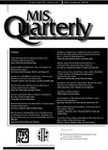-
作者:Hamilton, Scott; Ives, Blake; Davis, Gordon B.
作者单位:University of Minnesota System; University of Minnesota Twin Cities; New York University
-
作者:Dickson, Gary W.
-
作者:Ewers, Jack; Vessey, Iris
摘要:Information Systems (IS) is facing a dilemma: software is absorbing an ever-increasing proportion of the total IS budget while maintenance is absorbing an ever-increasing proportion of the software budget. In the not too distant future, unless this trend is arrested, or reversed, nearly all software resources may be required for maintenance. There are certain projected developments which give hope for the future though not in the short term. In the meantime IS management must use other approac...
-
作者:Merten, Allan G.; Severance, Dennis G.
作者单位:University of Michigan System; University of Michigan
摘要:Organizations continue to increase their use of computers in strategic, tactical, and operational information systems. During the last few years, corporate and data processing management have often expressed concern over the potential for computer system failure and abuse. This article presents the results of a survey of data processing executives which addressed both the characteristics and quality of data processing control systems. The survey was performed as a component of a comprehensive ...
-
作者:Ginzberg, Michael J.
作者单位:New York University
摘要:Previous analyses of the MIS implementation process have focused on the conduct of individual process stages as explanatory of successful or unsuccessful implementation. Process stages, however, involve multiple issues, and it is unlikely that all issues are equally important for good performance at a stage. This article attempts to identify generic implementation issues those issues which arise at many process stages. An empirical analysis identified six such issues, and suggested that three ...
-
作者:Huber, George P.
作者单位:University of Wisconsin System; University of Wisconsin Madison
摘要:Today's Decision Support Systems (DSS) are almost invariably designed to function in rational, or rationalized, decision making environments. Many organizational environments, such as political environments or garbage can environments, are more accurately portrayed, however, with models other than the Rational Model. Can DSS be useful in such environments? What are the boundary conditions for the application of DSS? These are the questions addressed in this article.
